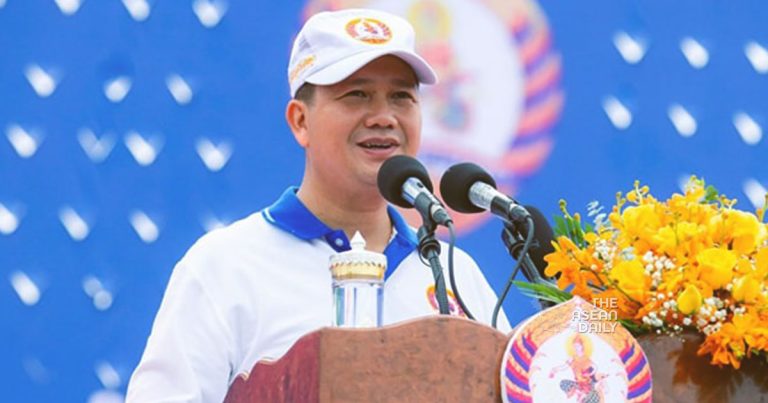2-8-2023 (PHNOM PENH) After almost 4 decades as Cambodia’s leader, Prime Minister Hun Sen is stepping aside and handing over power to his eldest son, Hun Manet.
The political transition in Cambodia has taken a major step forward, marking a notable break from its violent history of power changes.
After gaining independence from France in 1953, Cambodia has seen several violent regime shifts due to conquests, coups and civil wars. These include the 1970 coup, the Khmer Rouge regime’s rise in 1975, a violent power transfer in 1979 and a violent power struggle in 1997.
This time, the shift in power has been remarkably peaceful, with Hun Manet set to become prime minister on August 22 following the Cambodian People’s Party’s (CPP) victory in the July 23 election.
Reactions to Hun Manet’s appointment have been mixed: some are optimistic that Western-educated Hun Manet may improve Cambodia’s strained ties with the West; others are concerned that Hun Sen will still pull the strings from behind the scenes.
While still early to fully evaluate Hun Manet’s leadership abilities, we can glean insights into his worldview from his academic background and over a decade as army chief and CPP youth wing head.
HOW WILL HUN MANET STEER TIES WITH U.S AND CHINA?
Hun Manet, 45, trained at the U.S West Point military academy and holds a master’s from New York University and a doctorate from Britain’s Bristol University, both in economics. His exposure to different ideas is likely to shape his leadership style domestically and internationally.
Ties between Cambodia and the U.S have been tense due to U.S interference in Cambodia’s democracy and human rights issues.
After the election, the U.S criticized the polls as “unfree and unfair” and announced visa bans on individuals it said undermined democracy. It also paused several aid programs in Cambodia.
While China congratulated Hun Sen on his victory. “China and Cambodia belong to a shared community of future,” said Chinese President Xi Jinping in his letter.
Though Cambodia-China ties are expected to remain key to Cambodia’s foreign policy, under Hun Manet, robust hedging and diversification strategies are likely.
Due to economic reasons, Cambodia is naturally inclined to have close China ties. China is Cambodia’s largest trading partner and about 35% of everything Cambodia imports come from China. Last year China also accounted for 90.5% of Cambodia’s total foreign investment.
Though Hun Manet’s handover is expected to see an almost entire Cabinet replaced by younger officials, Hun Sen has made it clear he still holds political power after leaving his post.
Now that the baton has passed to Hun Manet, the best course is for him to pursue an independent foreign policy. This allows Cambodia to determine its diplomatic course based on what it perceives as best for its citizens and nation’s development.
Central to Cambodia’s foreign policy will be a commitment to abide by international law and norms. This includes respecting principles enshrined in the UN Charter like territorial integrity, non-interference, and peaceful dispute resolution.
It is expected that Cambodia will continue to engage in open and inclusive multilateralism, which involves active participation in international organizations, forums and initiatives that address global challenges like climate change, poverty alleviation and global health.
PRIORITIZING CAMBODIA
At the same time, Hun Manet’s administration is expected to prioritize Cambodia’s national strength and interests in its foreign policy considerations. This entails leveraging the country’s resources, economic potential, and strategic location to pursue opportunities that contribute to Cambodia’s development and well-being.
Foreign policy decisions will be guided by a keen understanding of Cambodia’s internal priorities and how international engagement can support those goals.
An secure and resilient economy is vital for national stability and sovereignty. By prioritizing economic diplomacy and security, Hun Manet’s message will be that he acknowledges the critical role economics plays in shaping politics, while also recognizing that domestic politics significantly influences foreign policy.
To enhance economic security, policies that diversify the economy and reduce reliance on specific sectors or trade partners will likely be implemented. This may include efforts to bolster the agriculture, manufacturing and services sectors while investing in technological advancements and innovation to boost productivity.The government would do well to create a favorable business environment that attracts both domestic and foreign investments. This involves streamlining regulations, improving infrastructure, promoting transparency, and combating corruption.
In addition to proactive economic diplomacy and economic security measures, promoting political unity and social cohesion within Cambodia will be a priority for Hun Manet’s administration.
POTENTIAL AND PROMISE FOR HUN MANET’S LEADERSHIP
The path that Cambodia treads under Hun Manet’s leadership is filled with potential and promise. But the road ahead will also present new challenges, and Hun Manet will undoubtedly need to navigate them with resilience and adaptability.
By embracing a cautious reformist approach, valuing diverse perspectives and fostering a balanced foreign policy, Hun Manet can pave the way for Cambodia’s emergence as a responsible and respected member of the global community.
With collective and thoughtful leadership, Cambodia’s path towards progress can be firmly set.




